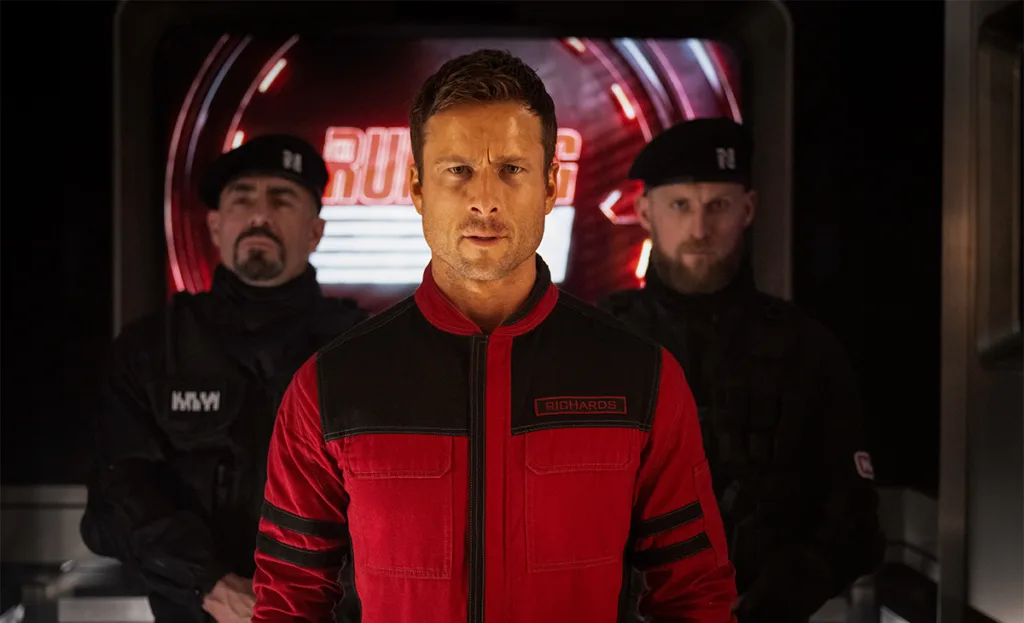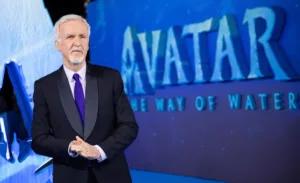“Stop filming me!” becomes the revolutionary mantra of The Running Man. By the end of the film, multiple characters scream it as they desperately try to escape an omnipotent surveillance state in this fast-paced action thriller.
The Running Man is directing by Edgar Wright (Baby Driver, Shaun of the Dead) and follows Ben Richards (played by Glen Powell) in a dystopian future where “The Network”, a techno-feudalist corporation controls almost all media, commerce and security in The United States. In an attempt to get money for his wife and sick daughter, Ben Richards enlists in The Network’s most fatal show, The Running Man. In it he must run for 30 days to win $1 billion dollars while television viewers, regular people on the street, and professional hunters try to track, trace and kill him.
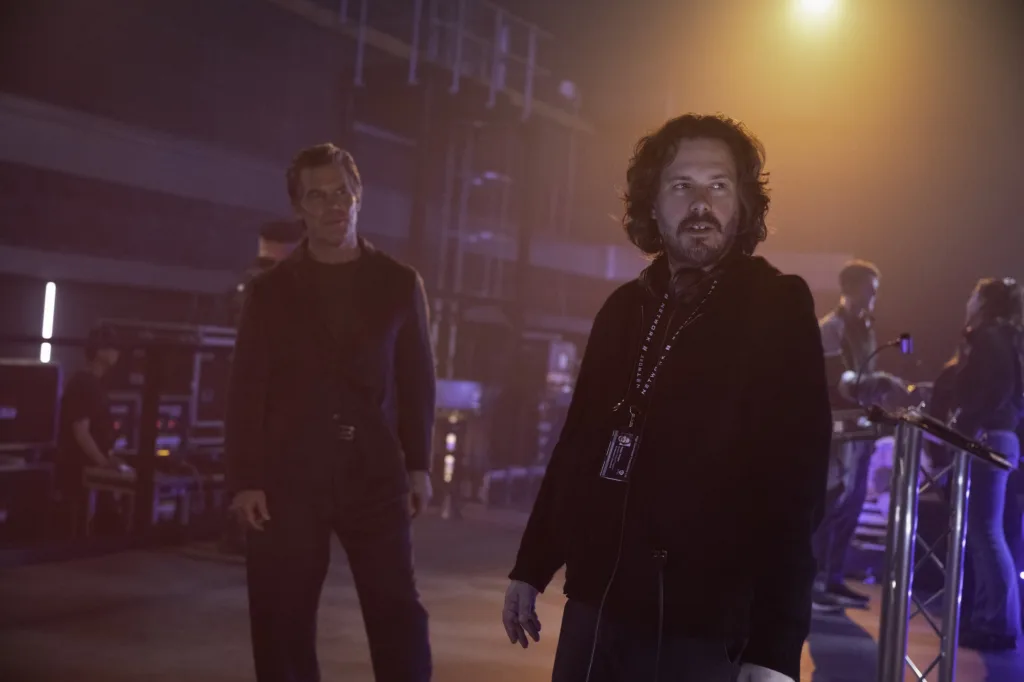
Edgar Wright brings his signature style to what is clearly his most ambitious project yet. With a sharp eye for kinetic editing, and shockingly fast-paced action that unfolds almost as quickly as this intricately complicated plot, he crafts a prescient, scarily relevant, and thoroughly entertaining film.
Thematically, the film is heavily focused on class inequality, the dangers of homogenous consumption of state-controlled media, and the violent monopolistic power of mega-corporations. Like The Truman Show mixed with The Hunger Games, The Running Man is as existential as it is brutally violent. Wright’s bloody and gory action is as strong as ever, and his tact for building a narrative that delivers shocking twists faster than you can keep up with makes it hugely engaging.

It’s clear that this is Wright’s highest budget and largest-scale production to date, because of how expansive the technologies shown in the movie are. Self-driving cars have detailed interfaces, flying spherical drones broadcast messages while enforcing constant surveillance, and auto-piloted mailboxes zoom around in the air delivering video-taped messages.
Particularly impressive is the way that Wright and his production designers have crafted a world that blends practical sets with computer-generated assets to create a world that’s convincingly different form our own. While it has elements of the cyberpunk-inspired futures seen in films like Ridley Scott’s Blade Runner, it’s much closer visually to our own world, with key differences that mostly serve to reinforce the omnipotent presence of The Network.
Every skyscraper, elevator, and hotel lobby is plastered with giant electronic billboards that advertise The Network’s “freevee” television shows, including The Running Man. This ever-present advertising reminds us of the monopolistic control The Network has over information dissemination but also functions to constantly place Ben Richards under threat of being reported because his face is on those billboards.
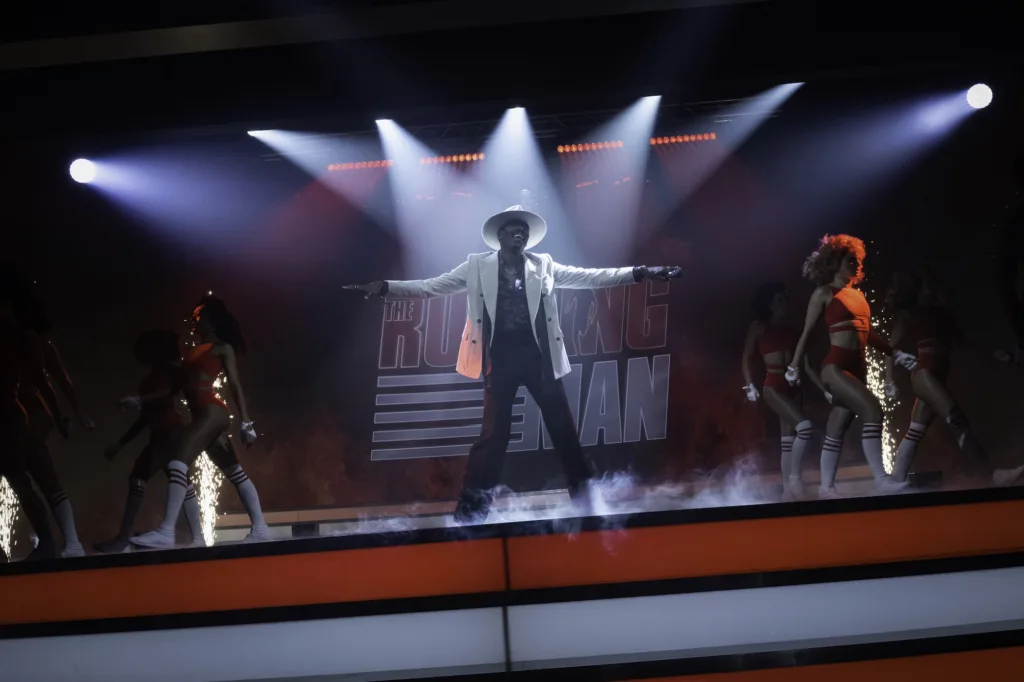
In creating a movie about a fictional reality show, Wright is also responsible for designing, staging and filming the actual reality show itself. This gives the film some brilliantly fun metatextual aspects of the film, which are especially impressive on a technical level because of the filmmaking on display. Wright depicts the behind-the-scenes making of the show, including the studio audence, but also features inserts of the actual show edited to feel like a typical reality show. In doing so, Wright has fun playing with the tropes of reality television, using all the trappings of over-the-top sound effects, bombastic visual transitions, and a flamboyant host to boot. He even includes his own sendup of The Kardashians, which he dubs “The Americanos”.
What’s narratively interesting about these metatextual aspects is that they creates a mechanism for Wright to insert political commentary. The Network constantly controls the narrative about The Running Man show. For instance, as part of the rules of the game, Ben Richards must film a daily update video to be broadcast for viewers of The Running Man. We see Ben Richards film these self-tapes, but Wright then cuts to the broadcast where The Network instead plays an entirely fabricated video that fakes Richards’ face and voice to paint him as the villain of the story and make sure audiences hate him. At a time when instantly generated AI-deepfake videos are becoming a reality, Wright’s depiction of how fast, seamless and dangerous such dissemination is feels more prescient than ever.
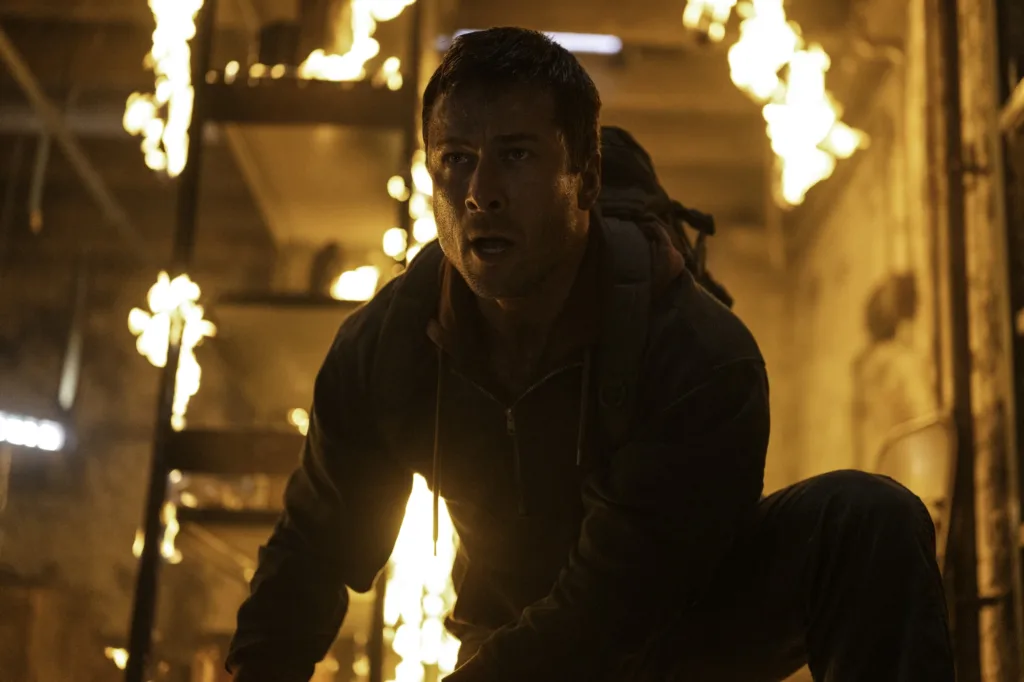
It’s a great reminder of the power for blockbuster filmmaking to serve the function of creating important cultural discussions. The dangers of a propagandistic surveillance state aren’t easily explainable to the average person. But when presented through the guise of a forged reality show, it becomes instantly relatable. Everyone is familiar with the heavily-edited style which allows reality shows to bend the truth and create a fabricated story. With this film, Wright blows up that concept to a scale so large it proves how a techno-feudalist megacorporation can control the narrative for an entire society by creating docile viewers whose thoughts and opinions are hijacked.
Even better, Wright’s style of kinetic editing which cuts to musical cues and action beats is perfectly suited to giving visual impact to this kind of story. The way we cross-cut between Ben Richard’s point-of-view, to The Network CEO forging his words, and viewers watching at home, all within a matter of seconds, gives the audience an almost dizzying feeling, which is exactly how Richard’s feels being privy to how quickly and violently The Network can change people’s thoughts through weaponised lies. In a world where consolidated media and tech corporations have an increasingly monopolistic control over the narrative, The Running Man might be the best example of blockbuster filmmaking that lays out exactly the cautionary tale ahead of us.

For fans of Wright’s signature elements, there sadly aren’t as many of them here. While there’s one action sequence set to well-chosen needle drops, the usual visual gags and slick style isn’t as pronounced. The sheer scale and more serious tone of this movie mean that Wright has to prioritise efficiency in telling this story with his style taking a back seat.
By the same token, the enormous amount of plot that the film tries to fit into its 133-minute runtime means that it does feel rushed at times. In particular, parts of the second act introduced new characters so quickly that we feel we only barely got to know them before they depart the story for us to move onto the next location.
Wright has mentioned that he sees this as a faithful adaption of Stephen Kings original book, The Running man (he points out, correctly, that the 1987 film starring Arnold Schwarzenegger was a big departure from the book). It seems to achieve that quite well, even if sometimes it means that character development is thin, and we don’t get enough time to sit with the consequences of people’s choices. There are very few quiet moments in the film, which leaves little room for reflection.
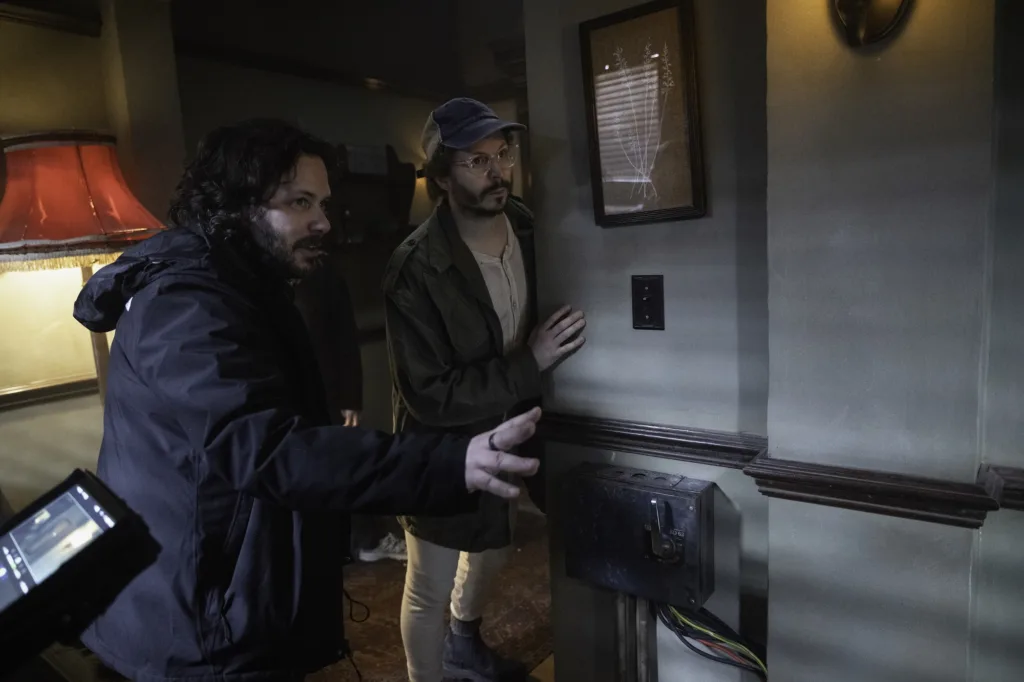
That said, the incredibly fast pace of the film equally serves a purpose of giving the audience a dizzying effect that they can hardly keep up with the curveballs being thrown at them, much like Richards’ world constantly keeps him second-guessing what’s true and what’s fabricated. And in essence, no director could be better suited at packing in so much, so quickly, and so brilliantly as Wright, whose trained himself in being one of the most efficiency directors with his shot choices and editing style.
The Running Man delivers action at breakneck speed, matched only by how quickly its dystopian narrative unfolds with shocking veracity. Edgar Wright’s fast-paced kinetic style delivers a prescient and thoroughly entertaining film about the dangerous of the surveillance state and monopolistic media control. One of the most refreshing and exciting action films in a long time.
Perhaps most importantly, it reminds us that the solution to centralised media and surveillance won’t come from more government regulation, it will come from us choosing to change the channel and watch something else.
If you enjoyed our The Running Man review, check out more from Screen Brief below.
Read more Movie Reviews from Screen Brief.

